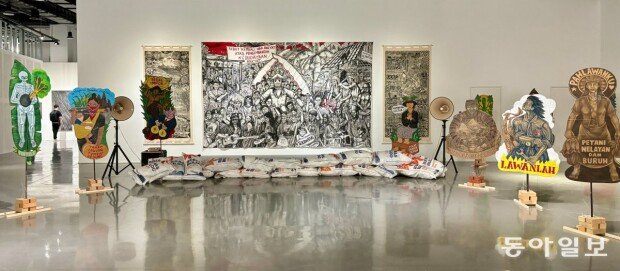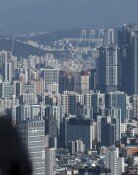‘The sea of art’ gets deeper
‘The sea of art’ gets deeper
Posted August. 20, 2024 08:29,
Updated August. 20, 2024 08:29

Bags of rice are placed in front of a painting of an angry mob coming out to the street. The speakers play songs that seem suitable for a demonstration. “Memedi Sawah/Scarecrow Installation” by Taring Padi, an Indonesian art group, about the issue of the rice price surge in the country, which was directly related to political and social instability, is on display on the first floor of the Busan Museum of Contemporary Art.
The wall facing the installation is filled with a series of portraits of female independence fighters by Yun Suk-nam. Yun, who learned to paint after she saw a self-portrait of Yun Du-seo in the Joseon Dynasty, painted 63 portraits of female independence fighters. Her paintings and Taring Padi’s installation are different in terms of periodical and national backgrounds, but both passionately depict resistance against those who oppress individual freedom.
The 2024 Busan Biennale titled “Seeing in the Dark” opened on Saturday, proposing an alternative of seeking liberation while respecting diversity. The exhibition was inspired by a self-governing society formed among pirates who traveled along the coast of Madagascar in the 18th century and Buddhist teachings. Sixty artists from 32 countries showcase their work, highlighting the flexibility of the pirate society in which anybody could be a leader depending on the situation beyond the fixed framework and the tolerance of Buddhism that respects the community.
The exhibition is held in four places – the Busan Museum of Contemporary Art, Busan Modern and Contemporary History Museum, Hanseong 1918, and Choryang House – with the Busan Museum of Contemporary Art featuring the most artwork. “Avalokiteshvara and Mary-The Truth Has Never Left My Side,” Songcheon’s Buddhist painting, and “Waves of Wreckage” by Jeong Eu-gene, which resembles a wrecked ship, are displayed at the entrance, representing the two topics of the exhibition – Buddhism and pirates.
In addition to South Korean artists, many Southeast Asian artists are featured at the Busan Biennale, which sets it apart from Biennales held in Europe or the U.S. Many pieces created based on the long pondering of political and social issues are displayed. Vera Mey and Philippe Pirotte who showcased their work in Germany focusing on the Bandung Conference, an international conference that played an important role in the creation of the Third World after the Cold War, will seek alternatives to get away from the remnants of colonialism and the cold war system at the Busan Biennale.
Min Kim kimmin@donga.com
Headline News
- Harris ‘first female president’ vs. Trump ‘again 2016’
- N. Korea builds 11-meter rampart after road demolition
- Democratic Party eventually agrees to abolish financial investment income tax
- Drug smuggling is seized twice a day on average this year
- Surrounded by ‘uniforms,’ NHL’s first female coach ‘time-out’







